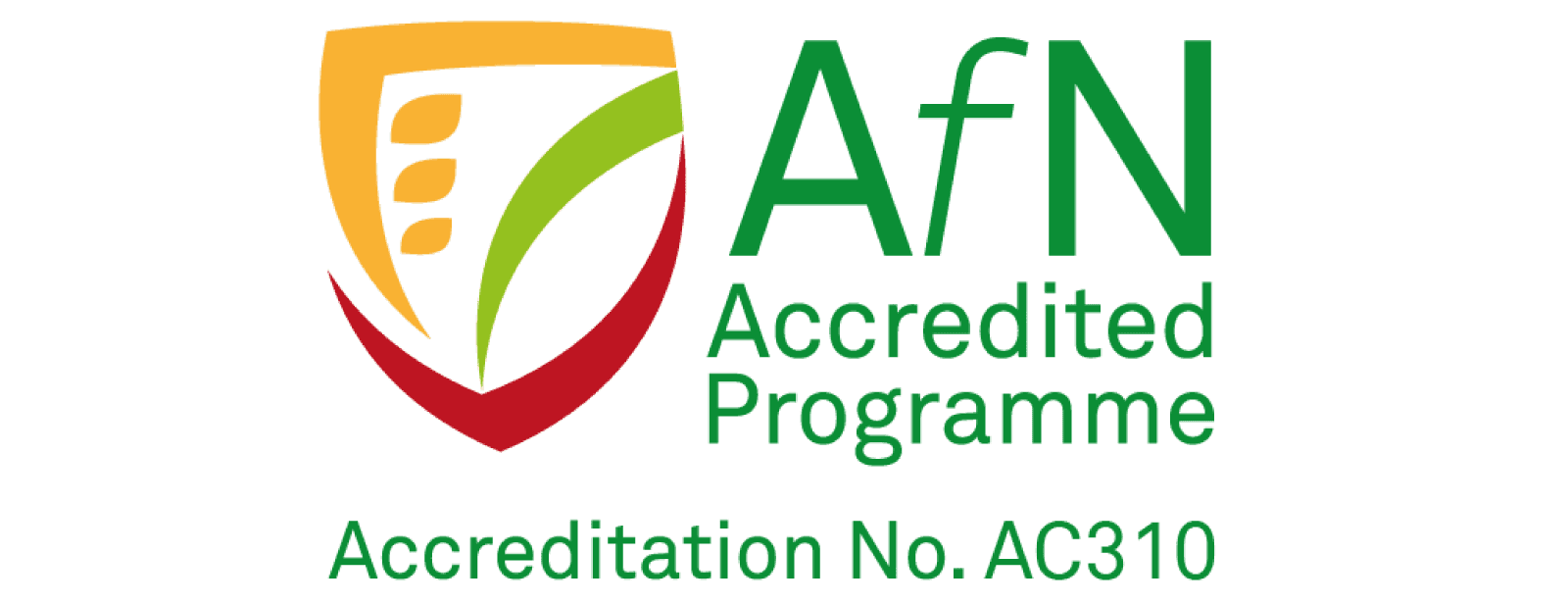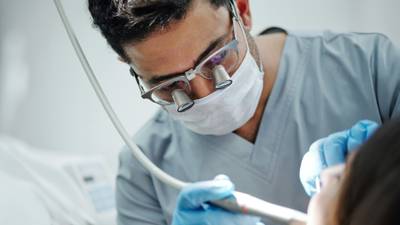How do we improve our understanding of the relationship between diet and health?
Study the clinical and scientific basis of human nutrition.
- Train in clinical, metabolic and molecular nutrition.
- Explore issues affecting public health.
- Learn how to help prevent disease.
This online Masters in Clinical Nutrition is accredited by the Association for Nutrition (AfN). It’s the voluntary regulator for nutritionists and nutrition scientists in the UK.
This flexible Clinical Nutrition degree fits around full-time work and lets you set your own study pace.

AfN accredited programme
MSc Clinical Nutrition is accredited by the Association for Nutrition (AfN).
Graduate and you can register with the UK Voluntary Register of Nutritionists as a Registered Associate Nutritionist.
By the end of this degree, you’ll be able to...
-
Describe the scientific basis of nutrition.
-
Explain nutritional requirements, from the molecular through to the population level.
-
Describe the food chain and its impact on food choice, integrating the food supply with dietary intake.
-
Evaluate food in a social or behavioural context, at all stages of the life-course.
-
Apply the scientific principles of nutrition for the promotion of health and wellbeing of individuals, groups and populations.
-
Apply for direct entry to the UKVRN as a Registered Associate Nutritionist.
What you’ll study
You can choose to study for a:
- Masters (180 credits)
- Postgraduate Diploma (120 credits)
- Postgraduate Certificate (60 credits), or
- start with one of the short courses that make up this degree (15 credits).
How you’ll study
Online learning
This is a multi-disciplinary and research-led Masters degree. It’s delivered part-time, entirely online.
Your teaching
Your teaching is delivered through MyAberdeen, our online Virtual Learning Environment (VLE). It holds all the materials, tools and support you’ll need in your studies. Take a look around MyAberdeen.
You can access your learning materials on computer, smartphone and laptop, 24 hours a day. You do not need to purchase any books at all. You’ll find a range of resources at your fingertips, including online access to our award-winning Sir Duncan Rice Library.
Live teaching sessions are recorded for you to join live, or stream later at a time that suits you.
Your tutors
You’ll learn from leading academics and health professionals in our School of Medicine, Medical Sciences and Nutrition, and the Rowett Institute.
Assessments
All assessments are completed and delivered online.
Hours for taught courses
To study part-time, we recommend you take a maximum of 30 credits per term. Students typically take one or two 15-credit short courses per term.
15 credits
- Around 150 hours of study and assessment time to complete.
- You’ll study 10 – 15 hours per week per term.
30 credits
- Around 300 hours of study and assessment time to complete.
- You’ll study 20 – 30 hours per week per term.
This is a guide to the time required for a typical student at this level to achieve the learning outcomes. This includes time for independent study, as well as teaching and assessments.
You can largely set your own study hours each week to cover the materials. MyAberdeen is available 24/7, so you can log in and study when it suits you.
Activities at fixed times
There may be some activities scheduled at a fixed time, such as online meetings with your tutor or assessments with deadlines. But otherwise, you can access and work through each course at your convenience.
Hours for 60-credit projects
A 60-credit project is around 600 hours of study time.
This is around one term of full-time study.
You can dedicate a full term to your project and work on it full-time. Or you can complete it part-time, spreading the hours you dedicate to it over two terms.
Hours for 30-credit projects and case studies
A 30-credit project or case study is around 300 hours of study time. That’s around 20 – 30 hours per week per term.
You will dedicate a full term to your project or case study.
When you study with us, you can expect a first-class support structure so that you’re never alone in your studies.
But learning online does mean you have to motivate yourself and manage your own time.
Your most important commitment will be time – the time to work through, reflect on and understand your teaching materials.
Before you start a course that involves a high degree of independent study, we recommend looking at the time you will be able to devote to your studies each week:
- Be realistic
- Create a weekly schedule as a guide
If you have any questions about studying online, get in touch with our friendly team. We’re here to help.
Our first-class support structure will ensure that you aren’t alone in your studies. You’ll have contact with your tutors via MyAberdeen and email. You can use social media and discussion boards to chat with your fellow students too.
We provide a wide range of services to support you in your studies and beyond:
- Careers and Employability Service
- Disability support
- IT support
- Library support
- Student Support Service – help with finances, wellbeing and non-academic issues
- Student Learning Service – study support, with advice sessions available
- Aberdeen University Students’ Association (AUSA) – run by students for students
- Toolkit – clever apps and free training that can make your study life easier
Wherever you are in the world, you’ll feel part of our very special Aberdeen learning community.
We’re a member of the Access scheme run by the Society of College, National and University Libraries (SCONUL).
Access study spaces, books and journals in your area
The SCONUL Access scheme allows you, as a University of Aberdeen student, to access books and resources at university libraries across the UK and Ireland, or visit them for a quiet place to study.
You’ll be able to use study spaces, books and journals at over 150 university libraries which belong to the scheme.
Study with the Rowett Institute
Join us online and you’ll learn with the Rowett Institute. It’s been informing government health policy and establishing the link between diet and health for over 100 years.
You’ll be joining an institute at the forefront of scientific research into diet-related health and food security issues today.
Your support team
Our friendly team are here to answer any queries you have before, during and after your studies.

Dr Alan Sneddon
Alan is the degree coordinator. He’ll be on hand to answer any questions about degree content before you start and to help you throughout your studies.

Clare McHattie
Clare is part of the School’s postgraduate teaching support team. She’ll be there throughout your studies to answer any of your non-academic queries.

Get in touch
The online education team is here to answer any questions you have right now about this qualification, or about studying online.
Ask us a questionWhere this will take you
Become a Registered Associate Nutritionist
MSc Clinical Nutrition is an AfN accredited programme.
This means, once you graduate, you can apply for direct entry to the UK Voluntary Register of Nutritionists (UKVRN) as a Registered Associate Nutritionist (ANutr).
The degree was re-accredited by the AfN in June 2025 and will remain so for five years.
Find out what it means to be a Registered Associate Nutritionist.
Careers
Completing the MSc Clinical Nutrition at the University of Aberdeen will give you the knowledge, understanding and practical insight required to advance your career in nutrition. You will broaden your career opportunities and develop an invaluable network of contacts.
Career options available to you include:
- Nutritionist
- Public Health Policy Manager
- Nutrition and Dietetics Coordinator
- Fitness and Nutrition Counsellor
- Further study (PhD)
- Academic jobs in universities (including lecturer, researcher)

Lifelong career support
Our career support doesn’t stop when you graduate.
You have access to our free careers service while you study, and beyond.
- 1:1 appointments
- CV checks
- Interview prep
- Job opportunities
Graduate voices
Hear from Simone Chung, who graduated from online MSc Clinical Nutrition in 2024.
She joined us to graduate on campus and explained what it was like to study for her MSc online.
Fees and funding
Tuition fees typically increase each year. A 3% fee rise has been confirmed for academic years 2026/27, 2027/28 and 2028/29.
Our indicative costs include a 3% fee rise each year.
Pay as you go
This is a pay-as-you-go qualification.
You do not have to pay the full tuition fee upfront.
You can spread the cost and pay as you go, term by term.
How it works
- You decide how many credits to study for each term.
- At the start of term, you pay only for the credits you’re taking that term.
- This gives you control over your costs and workload for each term of your qualification.

Your personalised cost breakdown
Use the degree scheduler to plan your studies and see your cost breakdown, term by term.
Learning resources
Access to all the books and resources you need are included in your tuition fee. They’ll be made available to you online and you do not have to buy your own copies.
Printing
You may wish to set aside a small budget for printing, depending on how you like to work.
There are several ways you may be able to get help funding your studies:
- Employer sponsorship – we accept full and partial fee payments from sponsors
- Student loans
- Scholarships – search our funding database for scholarships
Find out more about funding options.
Student card
All our students are entitled to a University of Aberdeen student card. This gives you access to a range of student discounts around the city and online.
20% Alumni discount
You’re entitled to 20% off our postgraduate taught degrees and short courses if you have a degree from the University of Aberdeen. View Alumni discount details.
10% NHS discount
NHS staff receive 10% off online postgraduate degrees and short courses offered by our School of Medicine, Medical Sciences and Nutrition; our School of Psychology; and our ILM leadership courses. View NHS discount details.
How discounts work
Discounts are applied during your application process. Only one discount can be used per application. If you are eligible for more than one discount, we will apply the largest discount for you.
Choose the University of Aberdeen for your online nutrition degree

Unique expertise
Learn from tutors and scientists at the forefront of nutrition studies, publishing research into gut health, metabolism and obesity.

Nutritional health pioneers
Study with the Rowett Institute. Governments and the food and drink industry have turned to us for research for decades.
Find out more about Rowett research
NHS and alumni discounts
NHS staff get 10% off this online degree. University of Aberdeen alumni get 20% off.
Entry requirements
MSc, PgDip and PgCert
- A 2:2 (lower-second) honours degree in Biological Sciences or Life Sciences
- or equivalent research or field experience.
These are our minimum entry requirements. They are given as a guide and do not guarantee entry.
Short course route to online MSc Clinical Nutrition
If you do not meet these entry requirements, or are not ready to commit to a full MSc, you may be able to use our online short courses as a route into this degree.
Find out about our short course route to entryEntry requirements
We welcome students from all over the world.
See the minimum entry requirements above. If you do not have qualifications from the UK, check equivalent qualifications from your country.
Visa requirements
You do not need a student visa to study online with us.
English language requirements
Teaching is delivered in English.
If English is not your first language, use our English requirements checklist to see if you need to provide evidence of your English language skills when you apply.
English language tests and scores
If you do need to provide English language test scores, these are the tests and minimum scores we accept.
This degree has its own set of distinct English language requirements. This is to satisfy the requirements of our accrediting body, the Association for Nutrition.
IELTS Academic, IELTS UKVI Academic, or IELTS Online (not IELTS Indicator or IELTS General Training)
- 6.5 overall
- 6.0 for listening, reading, speaking and writing
TOEFL iBT or TOEFL iBT Home Edition
- 90 overall
- 21 for listening, reading, speaking and writing
- TOEFL DI code is 0818
Cambridge English: B2 First, C1 Advanced, or C2 Proficiency
- 176 overall
- 169 for listening, reading, speaking and writing
LanguageCert Academic / LanguageCert Academic SELT
- 70 overall
- 65 for listening, reading, speaking and writing
Oxford ELLT Digital – English Language Level Test Online
- 7.0 overall
- 6.0 for listening, reading, speaking and writing
PTE Academic (online test not accepted)
- 62 overall
- 59 for listening, reading, speaking and writing
Skills for English: SELT
- B2 pass with merit
Duolingo – tests taken from 1 July 2024 onward
- 120 overall
- 105 for listening, reading, speaking and writing
University of Aberdeen Pre-sessional English (PSE)
- Pass
- Valid for one year. Refresher can be offered if out of date
Pre-sessional academic English preparation programmes undertaken at other UK universities
- Pass at an equivalent of 6.5 (C1)
- B2 in all four skills
- Certification must be within one year prior to the start of your course
For more information about language qualifications see our English Language Requirements page.
You apply through our online Applicant Portal. It allows you to upload relevant qualifications and documents.
There is no application fee for our online programmes.
What you need to apply
- Degree transcript
- Personal statement
- Degree certificate
- CV / Resume
Apply now
Start with our step-by-step guide. It explains degree transcripts, what to write in your personal statement and how to use our Applicant Portal.
You can apply to start in either September or January.
Apply as early as you can. This is so we have time to review your application and get a decision to you. We also want to ensure you have time to enrol before teaching starts.
September 2026 intake
For our September 2026 intake, the application deadline is 6 September 2026.
You will need to accept your offer and provide any outstanding documents to meet the conditions of your offer by 13 September 2026.
Teaching starts on 21 September 2026.
January 2027 intake
Teaching starts on 25 January 2027.
Application deadlines will be announced in due course.
You will need access to:
A computer (PC, laptop or Mac) with an up-to-date operating system
Most teaching materials are smartphone- and tablet-friendly. But we recommend a proper laptop or desktop for completing assignments comfortably.
Reliable internet access
We recommend:
- a wired connection
- a minimum download speed of 2 Mbps so you can take part fully in live sessions.
Speakers or headphones
- We recommend a headset with built-in microphone and earphones if you’re likely to study in an environment with background noise.
- A webcam is optional, but you may like to use one for some interactive sessions.
Software
We’ll give you access to Office365 applications. This means you can use online versions of Microsoft Word, Excel, PowerPoint and OneDrive and install these programs on up to five personal devices.
If your course requires specialist software, we’ll provide you with access to this and a licence that lasts throughout your studies.
See our detailed IT requirements for more information.
Try our degree scheduler

Choose your courses
See all the courses that are part of this degree and choose what you want to study.

Manage your study schedule
Control the pace and cost of your degree. Decide how much you want to study each term.

Save to your wishlist
Save your schedule to your wishlist so you can view and edit anytime.
Master of Science
180 credits
£17,060
This indicative cost is based on 180 credits of study over two years, starting in September 2026.
Postgraduate Diploma
120 credits
£11,320
This indicative cost is based on 120 credits of study over two years, starting in September 2026.
Postgraduate Certificate
60 credits
£5,580
This indicative cost is based on 30 credits of study per term, starting in September 2026.
Start with a short course
£1,395
This indicative cost is based on 15 credits of study in the 2026/27 academic year.
Apply for this programme
- Start month
- September or January
- Indicative cost
- £17,060
This indicative cost is based on 180 credits of study over two years, starting in September 2026.
Apply via our Applicant Portal







